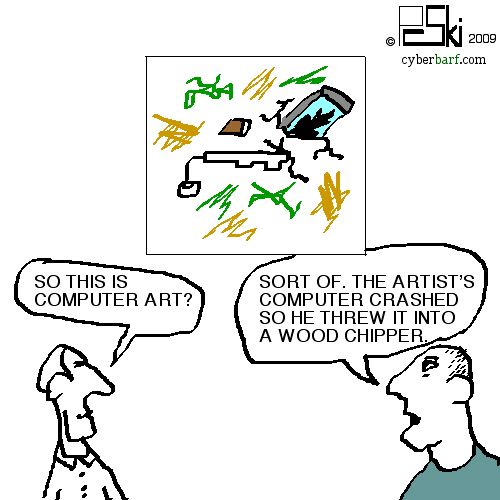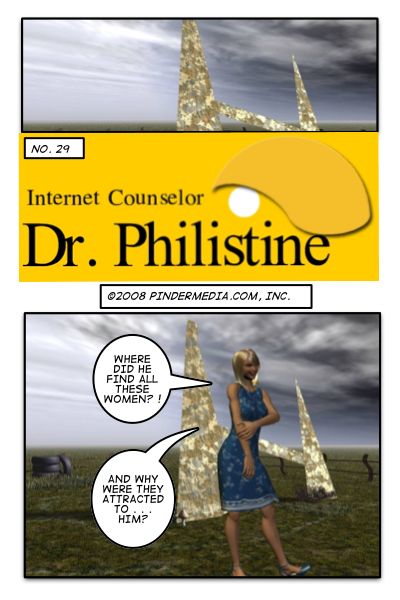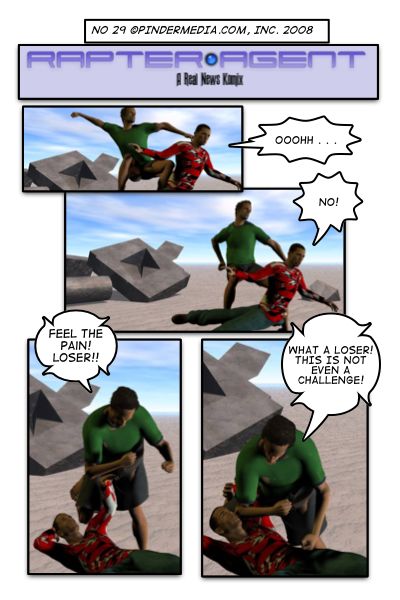| cyberbarf8.10 |
EXAMINE
THE NET WAY OF LIFE
|
 |
 |
 |
|
IN THIS JUNE, 2009 ISSUE: NEW MUSIC MODEL * iTOONS * WORLD SNAPSHOT * KOMIX * THE WHETHER REPORT * THE REMOTE CONTROL GENERATION
|
cyberbarf
NEW MUSIC MODEL MAKE THEM PAY ESSAY
The record industry is that last gasping dinosaur of an old business model: total control of the artist. In years gone by, it was cost prohibitive for a musical artist to record a demonstration tape, let alone an album of original songs. Record labels and producers locked up the key rights to songs, lyrics and music, as the enticement for a person to reach their dream of being a professional artist. Most people who buy music do not realize that the revenue generated from a song sale is sliced thinly between many parties like a turkey breast at Thanksgiving dinner. And in the end, the actual artist may only receive the smallest share of the bounty.
Record labels signed bands to prohibitive contracts. It required the band to generate product for the label for a number of years; to use its recording studios, distribution and marketing services, all of which were charged back to the band's “account.” And advancements were against future revenues. By the time the band recorded its first album, it could have been in debt to their own label hundreds of thousands of dollars. Further, if the band did not like how the label was selling the band, the artist could not take its own music and move it to another company. Many musicians had unknowingly given up their song and publishing rights to the label in consideration for the label “investing” resources for their career. Older bands were basically indentured servants throughout the term of their original contracts. It is almost a cliché that old bands usually broke up because of money issues - - - the lack of money. This is also the reason why some bands tour so much: it is the only way to generate independent cash flow.
Record labels had a monopoly on the physical product. It's manufacturing plants pressed out the vinyl LPs or CDs that flooded the music and department stores. The industry controlled the flow of product and the basic price structure of what music would cost the consumer. It had wholesale jobbers who would restock store bins with the latest music offerings as a service to the retailer. It was a perfectly closed business system.
But the internet changed the music world. As the recently concluded Pirate Bay trial showed, the industry is trying to dismantle the internet's peer to peer ability to stream copies of music files around the world. Once a music track can be recorded in computer bytes, it has lost its physical manifestation that a label used to be able to control. Instead of trading physical records, people can now just point and click a file over a computer network. Instead of trading a physical record which you own to a friend (which is legal), a computer copy of the music file being sent to another is infringement of the owner's copyright. A copyright is the right to make additional copies of an original, creative work. Owners of copyrighted materials can only generate money for their work by selling additional copies to consumers. The Internet has destroyed the physical barrier between publisher of copyrighted materials and the end consumer.
Part of the problem is the culture spawned from the Internet Early advocates of the Internet believed that the network should remain free: a free flow of information. However, in time, that message has been twisted to mean that current Internet advocates believe the network should have all information being free (no charge). It is hard to understand how a capitalistic society which valued and rewarded hard work (those hard workers getting paid for what they have accomplished) has suddenly decided to take the benefits of others hard work but not want to pay anything for it. This is not even a democratic socialist model (which seeks to control the means of national distribution) or a utopian model (where everyone is treated the same.) It is more like an Machiavellian model of anarchy.
So the music industry's reaction has been to sue downloaders for infringement. Even though it is unclear how the RIAA has standing to bring suit against individuals (since the trade organization is not the copyright holder of any kind), it is starting to at least cause major problems for individuals who cannot afford to litigate in the federal courts. The RIAA is picking on the week sheep in the Internet field; trying to build up a body of legal precedent before it goes after the big players, the wolves (the Internet hosting services, the bit torrent developers, or the big boys like Google, whose search engines are alleged to help contribute to the problem). But that takes money in order to try to extract money. So the music industry is also demanding that legal music sellers charge more money for song sales. It has finally convinced even the iTunes store to mark up new releases at a higher price (in exchange for lower some prices on older catalogue selections). But these are merely pennies on the old dollar under the old closed system. The new motto is that Everybody's Gotta Pay. It has gone so far as to lobby Congress to pass legislation to allow the federal government to act as the industry's court pit bull to sue alleged infringers for damages. In essence, the tax payers or American citizens, will bear the future unlimited cost of infringement litigation on behalf of the record industry. Talk about your special legislation evils.
But in the end, where will this all lead to? The cash cow is out of the barn. And the Internet pirates have already slaughtered it and given away the meat for free. It will be difficult to change the present with policies from the past. The music industry is just like the former rust belt industrial companies where their old manufacturing plants sit abandoned, boarded up and weed infested due to global outsourcing and free trade imbalances with the third world and China, which have their own differently views on what sort of protection (or nonprotection) of intellectual property rights. An American company may have gone overseas to manufacture its product cheaper in China, only to learn a short time later that the Chinese have totally copied it and are selling it cheaper to its consumers. Yes, there is a cruel irony in the new global economy which has been driven by the advances in technology and cheap capital resources.
 |
 |
cyberbarf
iTOONS TECHNOLOGY CARTOONS



cyberbarf
WORLD SNAPSHOT GLOBAL BLOGGING
If you go to any blogging network, like blogspot, and flog around to the next random blog page button, you will find that the international technorati is becoming a homogenous collective of similar interests.
While Americans may be obsessed with their favorite football team, the rest of the world devote pages to their favorite footballers, too (international soccer clubs). An average person may have a running web diary, the international bloggers have almost the same personal experiences: pictures of their children, pictures of their pets, stories about their hobbies, photography and art projects, fixing up their current residence, vacation adventures, travel stories, and their favorite foods in words or images.
You will find the same types of pages throughout the continents: a family photo diary from Sweden, then the next one from Brazil, then Mexico, then Russia, then Egypt. Though we speak different languages, live in different cultures, it is becoming more apparent that mankind is more similar than dissimilar in its core, personal interests.
Forty years ago, people could only learn about the far corners of the globe through their local media, at times filtered through the propaganda of their government. But now, there is no barrier to taking uncensored samples from across the world. There are web page translators where you type in the URL in a foreign language and the page reloads in English. There is no excuse not to try it. You will find that young people in Europe have the same phobias, fears, angst, boredom, musical diversions and educational career concerns as their counterparts in America.
cyberbarf
KOMIX REAL NEWS KOMIX
 |
 |
cyberbarf
THE WHETHER REPORT STATUS
Question: Whether trillions of taxpayer dollars will be wasted on bogus climate change research?
* Educated Guess
* Possible
* Probable
* Beyond a Reasonable Doubt
* Doubtful
* Vapor Dream
Question: Whether the change over to over-the-air digital television transmission signals, with the ability to add additional programming for each channel signal, will further dilute a broadcaster's overall viewership?
* Educated Guess
* Possible
* Probable
* Beyond a Reasonable Doubt
* Doubtful
* Vapor Dream
Question: Whether broadcast networks who put on the Internet their shows for free will generate sufficient additional revenue from that decision?
* Educated Guess
* Possible
* Probable
* Beyond a Reasonable Doubt
* Doubtful
* Vapor Dream
cyberbarf
THE REMOTE CONTROL GENERATION COMMENTARY
The problem with the current generation can be summed up in two words: Jungle Room.
Well, not directly. If you go to Elvis' Graceland Mansion, in his wild Jungle Room, you will find the root of all current evil: an old large Zenith television remote control. Yes, the same rectangular hunk of buttons we had in our own living rooms as children. The remote control. You did not have to leave the sofa to change the television channel anymore. It would trip society into one of those devilish retrospective theorems: the Law of Unintended Consequences.
Initially, the three broadcast networks had a monopoly on home entertainment. Bringing motion pictures from the theater into the comfort of your own living room would put radio into the status of background noise. And networks would program family shows in the first hour of their “prime” (advertising) time for the very reason that once a television set was on for the evening, the family rarely changed stations. It was a early viewing habit that network programmers seized upon. And once you had a family locked into your network, they would pretty much stay loyal to it, just like families who bought the same brand of automobiles over and over again (Ford families traded in to buy new Fords, General Motors families did the same, ect.)
Then, in 1956, Zenith engineers Robert Adler and Eugene Polley changed the viewing world by inventing the first truly remote control for a television set. This was the Cold War era, where technology advances were important to stay one step ahead of the Russians. The space race was on. Electronics was the new frontier. Any advancement in one area, begged for further refinement and invention. In the modern mass marketing of convenience in home decor and appliances, the advent of a remote control would appear to be the natural evolution of home technology.
The Zenith "Space Command" remote control is credited for starting the sedentary lifestyle of couch potatoism. Some sociologists and psychologists have opined that advent of the remote control is the starting point for the decline in many foundational principles of American way of life:
Impatience (the inability to allow things to normally conclude; instant gratification or snap judgments).
Couch potatoism (the habit of surrounding all life events around the boob tube: eating, drinking, lack of socialization, mind numbing repetitive behavior; addiction).
Lowest common denominator (the programmer's way of attracting the biggest audience).
Dumbing down (the collective intelligence of the nation with more and more drivel to fill air space).
Deconsumerism (skipping commercials).
Obesity (not turning off set in boredom but running through 100 channels of boring materials).
There is certainly circumstantial evidence that the average American has become more deficient in basic common sense. Example, road rage. What's the point? There is also an increased attitude of self-importance and over-valuing one's own personal worth. People are attempting to milk 15 minutes of fame into a non-stop media career. And it does not matter whether fame is for abhorrent behavior. In fact, bad behavior is rewarded more than ever. The growth could be tied to spoiled generation of Boomers who have passed on the less societal norms to emphasize instant gratification. The Now Generation means Now! Right Now!! Damn the consequences, I want my reality a game show. Indicted ex-Illinois governor Rod Blagojevich is an example of a person so self absorbed that he does not get It.